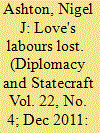| Srl | Item |
| 1 |
ID:
121171


|
|
|
|
|
| Publication |
2012.
|
| Summary/Abstract |
Jack O'Connell, who served as CIA Station Chief in Jordan between 1963 and 1971, was a unique and remarkable figure in the contemporary history of United States involvement in the Middle East. He established a closer personal relationship with King Hussein than any other foreigner before or since. Subsequently he went on to serve as the King's attorney-at-law in the United States and as his informal diplomatic adviser. This article explores O'Connell's role as CIA Station Chief, focusing in particular on his account of the events leading up to the outbreak of the 1967 war and of the covert diplomacy which followed it. It concludes that if O'Connell's claims are sustained, the United States must bear a greater share of responsibility for failing to prevent the outbreak of war and for the failure to secure a diplomatic settlement in its aftermath than has hitherto been acknowledged.
|
|
|
|
|
|
|
|
|
|
|
|
|
|
|
|
| 2 |
ID:
108887


|
|
|
|
|
| Publication |
2011.
|
| Summary/Abstract |
Relations between Britain and Jordan underwent a revival during the premiership of Margaret Thatcher between 1979 and 1990. Although no longer the dominant power in the Middle East, Britain's membership of the European Economic Community and the close relations between Prime Minister Thatcher and President Reagan meant that Britain was seen by King Hussein as an influential power to be courted. Thatcher shared Hussein's views about the Arab-Israeli peace process and lent him strong support as the voice of Arab moderation. She also sought to use her personal relationship with Hussein as a vehicle to further British interests, particularly through her promotion of British arms sales, both directly to Jordan, and indirectly, through Jordan, to Iraq. This article makes use of a large body of British official documents secured under the Freedom of Information Act and Jordanian documents from the Royal Hashemite Archive in Amman to illuminate the development of bilateral relations over the course of the decade. It concludes by showing how the differing responses of Thatcher and Hussein to the Iraqi invasion of Kuwait in August 1990 ruptured their relations. Drawing on sources which have previously been unavailable the article offers a fresh perspective on important aspects of the international history of the Middle East during the 1980s.
|
|
|
|
|
|
|
|
|
|
|
|
|
|
|
|